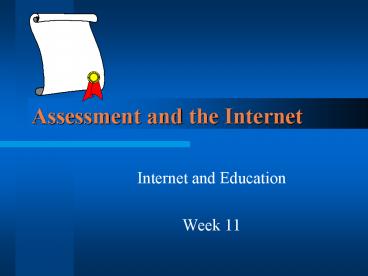Assessment and the Internet - PowerPoint PPT Presentation
1 / 19
Title:
Assessment and the Internet
Description:
Assessing critical and higher order thinking skills is difficult, but is it not ... in the Classroom: Mindtools for critical thinking, Prentice Hall, New Jersey. ... – PowerPoint PPT presentation
Number of Views:73
Avg rating:3.0/5.0
Title: Assessment and the Internet
1
Assessment and the Internet
- Internet and Education
- Week 11
2
Need for change!
- Changes in skills and knowledge needed for
success - Changes in our understanding of how students
learn - Relationship between assessment and instruction
changing our learning goals
3
What is the answer to effective and meaningful
assessment?
What gets assessed is what gets taught (Bond,
L.A.)
4
Assessment reform
- Setting more appropriate targets for students
- Encourages curriculum reform
- Improves instruction and instructional methods
- Requires staff development
5
Changes in teaching and learning
- Shifts in teacher attitudes and behaviour
- teacher- centred to student - centred
- individual tasks to collaborative work
- structured to exploratory
- competitive to cooperative activities
- classroom to whole world
6
How does this impact on assessment?
What is taught and what is learned is usually
determined by what is measured. Assessment
determines what students learn.
7
Assessment expectation
- State expectations
- School expectations
- Parent expectations
- Teacher expectations
- Student expectations
8
Purposes of traditional Assessment
- Traditional assessment has tended
characteristically to - decontextualize the learning
- focus on reproductive learning outcomes
- make the evaluation process artificial and
stressful - ( Jonassen, 1996)
9
The integration of Internet
- Fosters
- constructive learning
- critical thinking
- creative thinking
- reflective thinking
- development of problem solving skills
- collaboration
10
Evaluation of learning outcomes
- Constructivist environments encourage
- negotiation between learners and teachers
- the provision of authentic tasks
- the representation of multiple perspectives and
criteria
11
Authentic Assessment
- Students involved in setting goals
- Measures both content and process
- Measures meaningful and instructional activities
- Uses higher level thinking and problem solving
skills - Contextualised in real-world situations
- Generally requires more time
12
Types of assessment
- Performance assessment
- students ability to perform task and apply
knowledge - Writing tests
- measures language skills, content knowledge and
thinking skills
13
More types
- Portfolios
- describe achievements, progress and effort
- Culminating exhibitions
- address challenges of interdisciplinary analysis
14
Assessment during collaboration
- The completion of many tasks involve
collaboration. - Assessment should therefore replicate the
learning situation
15
Assessment of knowledge construction
- Traditionally students performance usually
compared with a standard - Assessment should rather provide feedback
- Self assessment
16
Criteria for evaluation
- Originality
- Complexity
- Coherence
- Inference
- Predictability
- Contextual relevance
- Repertoire of knowledge
17
Assessing critical and higher order thinking
skills is difficult, but is it not more relevant
to todays societal demands?
18
References
- Bond, L.A.(1995)Critical Issues Rethinking
Assessment and its Role in Supporting Educational
Reform Accessed, online 25/5/9 URL
http//www.ncrel.org/sdrs/areas/issues/methods/ass
ments/as700.htm - Classroom assessment and Testing, Education 173
Online Online, accessed 25/5/99 URL
http//www.gse.uci.edu/ed173online/notes/173unit10
.html
19
References (2)
- Dietel, R.J. Herman,J.L. Knuth, R.A. (1991)
What does research say about assessment?
Accessed, online 25/5/99 URL
http//www.ncrel.org/sdrs/areas/stw_esys/4assess.h
tm - Jonassen, D.H. (1996) Computers in the Classroom
Mindtools for critical thinking, Prentice Hall,
New Jersey.































